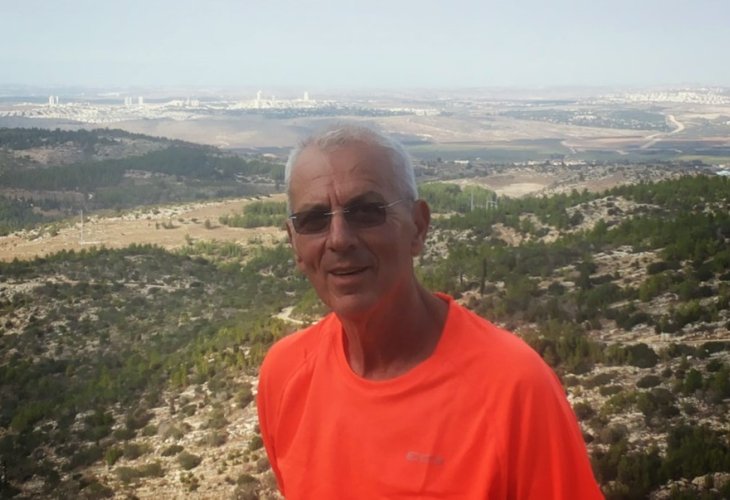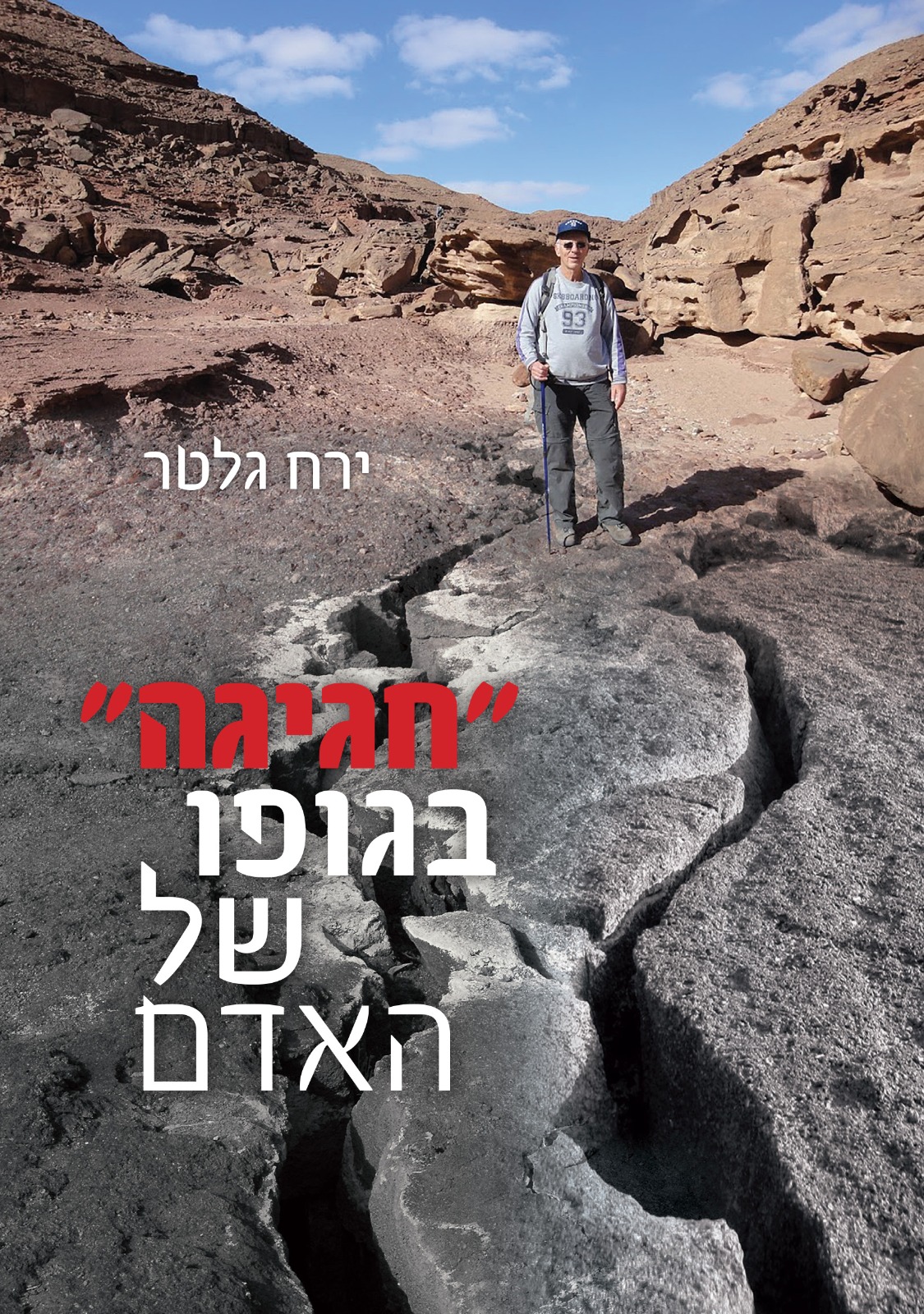"When I Was Diagnosed with Parkinson's, I Decided to Laugh. Then My Wife Was Diagnosed Too"
Yerach Gletter faces both his and his wife's Parkinson's disease with relentless humor. He jokes even about the prostate cancer and heart issues he developed. After years of various public roles, he's certain: "Now my role is to bring joy to the world."

If you have lived in our country for over a half-century, chances are you have come across the name Yerach Gletter—a proactive and energetic person who has succeeded in leading a variety of roles. Initially, in a short Jewish mission abroad, and later in Israel where he led numerous initiatives, managed the Jewish Culture Department in Bnei Brak municipality, and eventually held the highest position in Yeruham as the chair of the appointed committee. He also served as the spokesperson for Bar-Ilan University, was a public representative at the Tel Aviv Labor Court, and more.
About a decade ago, while still feeling young and fresh, Parkinson's disease was discovered in him, and since then he has discovered qualities in himself he didn't know before. "I discovered that I am an optimistic person with a sense of humor," he notes. "I also found that I know how to support others dealing with the disease, even my wife, who about three years ago was unexpectedly diagnosed with Parkinson's as well."
Celebration Inside the Body
Gletter's humor, as it turns out, is incorrigible. When I try to ask him how he can joke about a disease like Parkinson's, which inherently causes continual deterioration, he responds with a smile: "I feel like I have something to look forward to every day..."
How was the disease discovered in you?
"Until I got Parkinson’s, I was very active in sports. Among other things, I regularly walked with a group of hikers, went for walks four times a week around the city of Modi'in where I reside, and enjoyed every moment of physical exertion. About seven years ago, I went on a trip with my grandchildren, and afterward, one of my sons approached me on behalf of all of them: 'We talked about you, and it's worth visiting a neurologist.' To be honest, I was quite offended. I had never visited a neurologist before, nor any other doctors. I didn't even have a headache pill at home. I was angry, but my son insisted, and that’s how it happened—the neurologist referred me to various tests, and at the end, he told me: 'We were concerned about Alzheimer's, which we ruled out, but we discovered you have Parkinson's.'"

Yerach was then in his early 70s, and he didn’t even know the name of the disease. "Hashem gave me seventy completely healthy years," he notes, "so much so that at age 70, I asked to donate a kidney and passed all the necessary thorough screenings successfully. These are very meticulous tests, and if something slightest is found, they disqualify you from donating. Everything was completely fine with me, but for other reasons, I couldn't donate. But I was left with a feeling of a clean bill of health. So, when they said Parkinson's, I didn’t understand where it had come from, but when I started reading about it on the internet, my eyes darkened."
As if that wasn’t enough, he developed two more health issues during that time—prostate cancer and a heart condition. But if you expected Yerach to crumble, it turns out that this is precisely when humor came into play. "When I was hospitalized, I told myself nothing would break me. I remember lying in the emergency room, every moment a different doctor was diagnosing another issue, and instead of crying, I took flight on the wings of imagination, seeing in my mind's eye a variety of actors taking over my body, each competing and trying to influence, just like in a big play. The prostate cancer calls to Parkinson's: 'Don’t run so fast,' and it replies: 'Don’t boast, when you’re gone, I’ll still be here.' Thus, I continued to imagine this celebration, and suddenly I found myself laughing to tears, knowing that if a day comes when I write about it, the book’s title would be 'Celebration Inside the Body.' By the way, that’s exactly what happened in the end."
"There Is Room for Progress"
How does Parkinson's affect you today? In what way does it manifest?
"Parkinson's is a disease that varies greatly from person to person and can appear in different severities. In my case, stiffness was discovered on the left side of my body, and my speech became monotonous and less clear. I take pills that slow the deterioration, but I no longer speak fluently like before, and while I used to walk the Israel Trail hopping from rock to rock, now I take a short walk around the house and fear falling at every small step. Sadly, I can no longer undertake larger trips.
"Additionally, Parkinson's causes me to perform actions exceedingly slowly. For instance, I dress every morning for about an hour and a half, slowly and with great effort. The hardest thing is that they haven’t found a cure for the disease yet. That is, there are pills meant to slow the progression, but a real cure doesn't yet exist."
Yerach pauses for a moment, then regains composure with a smile appearing again: "I have always aimed to keep advancing, and indeed, I see progress; the disease doesn’t stop for a second."
In his case, progress is not just about his personal journey but also because about three years ago, his wife was diagnosed with Parkinson's too. "We truly complete each other," he jokes, "while my disease manifests in my left hand and leg, hers is on the right side of the body. It's hard for me to type on a computer because my fingers move, while my wife can type but not write. It's no coincidence that Hashem matched us together."
Speaking of writing, since the disease was discovered in Yerach, he has developed a strong urge to write. "I never wrote anything before, and suddenly I had a strong desire to write," he shares. "That’s how my first book 'Celebration Inside the Body' came about, where I humorously describe the journey I’ve been on since the disease was discovered. Now I also give lectures on the subject and talk personally with people facing similar difficulties. Often, I notice that after my talk, people open up more and even laugh. There were several who told me that until now they kept their illness a secret, and now they understand that they can open up and even laugh and ease the situation."
But how did you write the book if you have difficulty typing?
"Of course, I didn't write myself, but used the kind services of my grandchildren. Each grandchild that passed by me was honored to type a few pages. That's how the book was created. Later, I also published another book called 'Together,' with a historical-narrative story. My grandchildren typed that one for me too. The truth is that I was amazed afterward by the reader's responses, as I never saw myself as an author. Now I am diligently working on writing a third book."
A Medicine Called Humor
But where does your incorrigible optimism come from? What gives you strength?
"First of all, it's the understanding that I have no other choice. True, I can cry, but it's clear it won’t help. Additionally, it’s my nature, to succeed in overcoming obstacles. I’ve done it more than once during my hikes on the Israel Trail. I remember myself leading a group and reaching a giant rock two and a half meters high; it seemed impossible to get over, but in the end, not only did I cross it, but everyone did—a person would push from above, another from below, one pulled a backpack, another handed a stick, and within fifteen minutes we all crossed—50 people. And, of course, more than anything else, my faith helps me. I believe in Hashem and am completely sure that He doesn’t test anyone with a challenge they can't withstand. If I was chosen for the role, it’s probably suitable for me, so what's the point in complaining?
And are there any moments of crisis?
"There are small moments like these," he answers honestly. "But in difficult times, I remind myself to see the good things—the abundance that Hashem has given me, the children and grandchildren I love so much. The world is full of good things; you just have to pay attention and be thankful for them.
"By the way, my wife holds a completely similar outlook to mine. She doesn't rest for a moment and recently set up a branch of the national Parkinson's association in Modiin Illit. She's very active in it, and I'm proud of her and try not to interfere."
Do you sometimes ask yourself what will happen tomorrow?
"Certainly. It's impossible to ignore this thought. I also clearly see that my life is changing—we always managed on our own, never needing any help from others, and now it’s the first time we have a housekeeper. I also understand it's very important for my wife and me to fill out nursing and long-term care insurance forms to avail our rights. The social worker recently recommended that we start working on getting a license for a foreign worker. Although in this state we do not need it, thank Hashem, it's clear that it might reach such a situation.
"We're moving forward with eyes open and without denial. But at the same time, I prefer to focus less on difficult thoughts, understanding that they will lead me nowhere. Time and again, I remind my wife that there are people in much more challenging situations than ours, and actually, everyone has to deal with something in life, so this is what we’ve been handed, and we will stand with valor.
"We also try to take advantage of the time and go out to different places for leisure together. People with Parkinson's have the right to go to many places with an accompanying person for free, so we always joke that I accompany her, and she accompanies me. Humor holds us strongly, and it is indeed the most effective medicine I've discovered; it's proven."
To contact Yerach Gletter: Yerachglatter16@gmail.com

